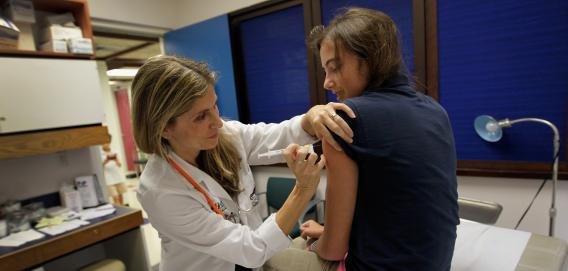American parents are increasingly citing safety concerns in their decision not to vaccinate teenage daughters against HPV. That’s problematic: The three-shot vaccination hasn’t been linked to any serious side effects. So what’s going on?
The study, released Monday in Pediatrics, looks at vaccination rates among American teenagers for a handful of illnesses, including HPV. HPV, the most common sexually transmitted virus in the United States, has been linked to cervical, anal, and throat cancer. Looking at parents’ reasons for not vaccinating (or planning to vaccinate) their teenage daughters in 2008 through 2010, the researchers found a startling increase in the number of parents citing “Safety concerns/side effects” as their main decision-making factor. In 2008, that percentage was 4.5 percent. In 2010, it jumped to 16.4 percent.
It gets worse: Despite the serious complications of contracting HPV, vaccination against the virus isn’t exactly widespread. In 2010, just 32 percent of girls aged 13-17 were fully vaccinated against HPV. To be sure, that’s an improvement on the 17.9 percent of teenage girls vaccinated in 2008, but still substantially lower than, say, the percentage vaccinated against tetanus, diphtheria, whooping cough, and bacterial meningitis. That means that parents, according to the study’s results, are responding to the HPV vaccine in a unique way. And not in any way that makes obvious sense.
Here’s the study’s take on what might be going on (emphasis ours):
“For HPV, the issues appear more fluid and more challenging. The consistent 11% to 14% of parents who gave the main answer ‘Not sexually active’ illustrates that parents mistakenly perceive this vaccine is related to and necessary only if there is current sexual activity. Another consistent response, given by 14% to 17% of parents across the 3 years studied, was that the HPV is ‘Not needed or not necessary,’ despite the high prevalence rates of HPV infection and of the infections dire consequences suffered later in life. Also troubling was the dramatic rise over the 3 years in safety concerns about HPV, which increased from 4.5% to 16.4% of parents over the 3-year period. This increase in safety concerns, which coincided with a decreased prominence of not recommended as a reason not to get HPV, may imply decreased parental reliance on clinician recommendations for HPV.”
As HealthDay notes, some parents are probably getting misleading information about the vaccination online. HPV vaccination has been (unnecessarily) controversial since health officials first started recommending it in 2006, in no small part because of HPV’s transmission through sexual contact. Currently, both the Centers for Disease Control and Prevention and the American Academy of Pediatrics recommend the vaccine for all children (boys and girls) at age 11 or 12. It’s intended to be administered well before a child becomes sexually active. But some have argued, contrary to the evidence, that the vaccination can encourage promiscuity.
As the CDC explains, HPV is the main cause of cervical cancer in women. There are 12,000 new cases of cervical cancer each year in the U.S., and about 15,000 cases of HPV-associated cancers in the U.S. each year.
Read the full study in Pediatrics.
